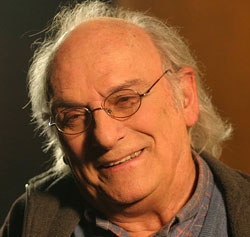Renowned Spanish Film Director and Screenwriter Carlos Saura to Receive Honorary Degree

MIDDLEBURY, Vt. – Award-winning Spanish film director and screenwriter Carlos Saura will receive an honorary Doctor of Arts degree from Middlebury College on Aug. 10. Middlebury College President Ronald Liebowitz will present Saura with the degree at a ceremony on campus. Antonio Saura, a son of Carlos Saura and a writer, film producer, and teacher, and Antonio Saura’s wife, Spanish actress Ruth Gabriel, will also attend the event.
“Carlos Saura is one of Europe’s preeminent film directors and Middlebury is honored to welcome him,” said Michael Geisler, vice president for Language Schools, Schools Abroad, and graduate programs. “In a career spanning more than half a century, he has brought cinema to new and more exciting levels.”
Saura, who began making films in the 1950s, is credited with revitalizing the Spanish film industry in the late ’60s and early ’70s. He wove dark political themes into his work, becoming known for initially subtle and then more blatant criticism of Francisco Franco until the Spanish dictator died in 1975 and Saura’s films were no longer edited by the sensors.
Saura’s work reflects the influence of Italian Neorealism and his mentor, Spanish surrealist filmmaker Luis Buñuel. According to the New York Times, “Saura freely blends reality with the macabre and an often grotesque surrealism to create worlds in which reality is subjective.” His films frequently focus on social issues in Spanish society, from drugs, street life, and juvenile delinquency to robbery, human violence, and social change.
During the 1980s, Saura began to explore the theme of national identity through music and dance. He examined traditional flamenco dance, a quintessentially Spanish element of Hispanic culture, to depict the themes of romance and unrequited love in a trilogy of films. Saura revisited the subject in 1995 with the documentary “Flamenco.” He later delved into Argentina’s national dance in the movie “Tango” in 1998.
Saura has won numerous awards from festivals and competitions around the world. At the Berlin International Film Festival, he received the Silver Bear for Best Director twice — for “La Caza” in 1966, and for “Peppermint Frappé” in 1968 — and the Golden Bear for his film “Deprisa, Deprisa” in 1981. The Cannes Film Festival has recognized his work as well, including “Carmen,” which received a Grand Prix in 1983. Saura’s “Mama cumple 100 años” was nominated for the Academy Award for Best Foreign Language Film in 1979 as was “Carmen” in 1983 and “Tango” in 1998.
Saura was born in 1932 in the Spanish city of Huesca but his family lived in Madrid during the Spanish Civil War. The fear of war he experienced as a child has surfaced at various moments in his films. Saura left school at age 18 to become a professional photographer before attending what is now known as Escuela Oficial de Cinematografía in Madrid, where he earned a diploma in directing. He became a professor there, teaching film direction until 1963.
Saura’s most recent film was “Flamenco, Flamenco” (2010), a sequel to his 1995 documentary “Flamenco.”

